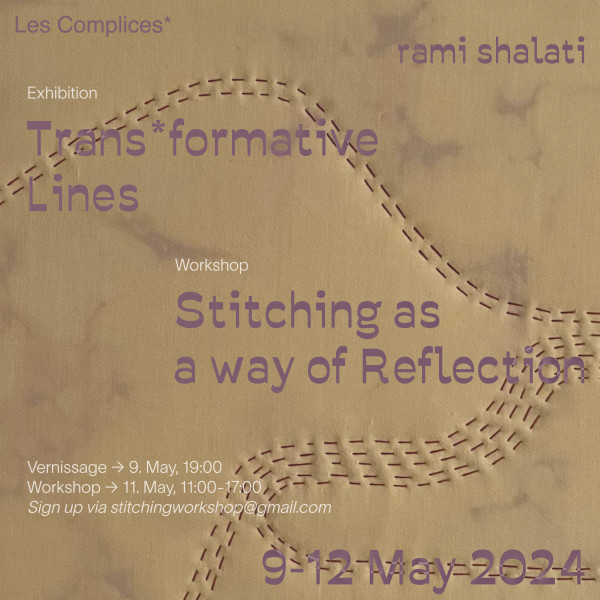EN
The body finds its position by aligning itself in the space it occupies, guided by the defining lines that shape matter, outline surfaces and provide a sense of stability. These lines, subtly navigating through openings and closures, create a landscape with areas that are both accessible and inaccessible. As lines are unconsciously traversed, they extend physical form into predetermined spaces, shaping our experiences in complex ways. Lines, however, are not just passive elements of the architectural and social fabric, but act as active agents of control. They mark boundaries that not only exclude and marginalize, but also shape physical and social space, construct identities and reinforce power structures. Their influence goes beyond the static, as lines trace movements and become signposts for navigating interactions and terrains. Beyond their physical manifestations, lines exert authority over identities and spaces and are closely intertwined with the constructions of binary gender norms. They enforce limitations and punish deviations, thereby upholding established hierarchies. The significance of lines thus goes far beyond their aesthetic contribution; they are of central importance for movement in the physical and social spheres and intersect with the spheres of power, identity and space.
_
rami shalati is a Berlin-based artist* with a background in fashion. rami shalati's work stands for a fluidity that challenges binary concepts and moves away from gender norms. Based on
autobiographical impulses, their work focuses on textiles, installations and performative areas that deal with post-migrant queer storytelling.
Stitching Workshop
“Trans*formative Lines: Stitching as a Way of Reflection”
Saturday 11.5, 11h to 17h (come and go as you wish)
Sign up: stitchingworkshop@gmail.com
What does it mean to be multilocal? To (dis-)belong to many locations? What brings up those feelings? The workshop "trans*formative lines" aims to empower participants to express and reflect on their personal experience of multilocality through queering their stitches. With guidance, participants will use their craft to explore their individual stories and feelings of (dis-)belonging and to initiate transformative processes through their own storytelling. The workshop is aimed at QTI-BIPOC individuals who experience multilocal identities and are interested in stitching as a means of self-reflection and self-empowerment. For this workshop there is no previous knowledge needed in stitching. The workshop will be held in both English and German.
More information will follow after signing up.
DE
Der Körper findet seine Position, indem er sich im Raum ausrichtet, den er einnimmt, und sich von den definierenden Linien leiten lässt, die die Materie formen, die Oberflächen umreißen und ein Gefühl der Stabilität vermitteln. Diese Linien, die auf subtile Weise durch Öffnungen und
Verschlüsse navigieren, schaffen eine Landschaft mit Bereichen, die sowohl zugänglich als auch unerreichbar sind. Während Linien unbewusst durchlaufen werden, dehnen sie die physische Form in vorherbestimmte Räume aus und formen unsere Erfahrungen auf komplexe Art und Weise. Linien sind jedoch nicht nur passive Elemente des architektonischen und sozialen Gefüges, sondern fungieren als aktive Kontrollinstanzen. Sie markieren Grenzen, die nicht nur ausgrenzen und marginalisieren, sondern auch den physischen und sozialen Raum formen, Identitäten konstruieren und Machtstrukturen verstärken. Ihr Einfluss geht über das Statische hinaus, denn Linien zeichnen Bewegungen nach und werden zu Wegweiser*innen bei der Navigation durch Interaktionen und Terrains. Über ihre physischen Erscheinungsformen hinaus üben Linien Autorität über Identitäten und Räume aus und sind eng mit den Konstruktionen binärer Geschlechternormen verwoben. Sie setzen Limitierungen durch und bestrafen Abweichungen, wodurch etablierte Hierarchien aufrechterhalten werden. Die Bedeutung von Linien geht also weit über ihren ästhetischen Beitrag hinaus; sie sind von zentraler Bedeutung für die Bewegung im Physischen und Sozialen und überschneiden sich mit den Sphären von Macht, Identität und Raum.
–
rami shalati ist ein*e in Berlin lebend*e Künstler*in mit einem Hintergrund in Mode. rami shalatis Arbeit steht für eine Fluidität, die binäre Konzepte herausfordert und die sich von
Geschlechternormen entfernt. Ausgehend von autobiografischen Impulsen konzentriert sich die
Auseinandersetzung auf Textilien, Installationen und performative Bereiche, die sich mit
postmigrantischem queerem Storytelling beschäftigen.
